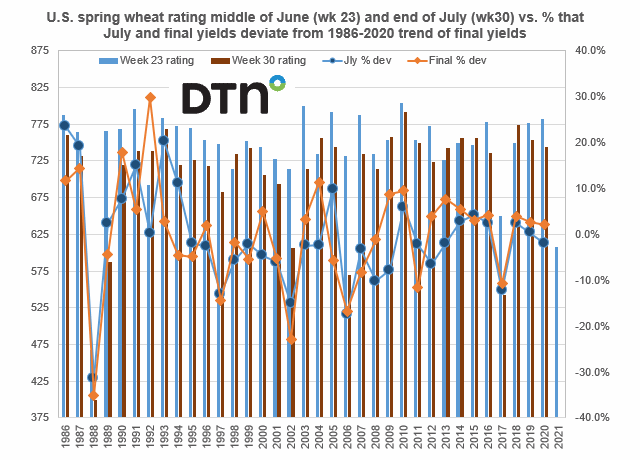Fundamentally Speaking
Key Corn, Soybean Areas See Ample Spring Rains
Weather is the number one issue this time of year and recent positive market action is linked to this as ongoing hot and dry conditions impact much of the Eastern Corn Belt while conversely, excess precipitation is seen in many areas of the Western Corn Belt, especially in more northern locales.
Still the fact is that the latest U.S. Drought Monitor report indicates that just 2% of the nation's corn producing area is in any form of drought (D1-D4), down sharply from 36% just three months ago and 57% one year ago and the lowest percent since April 2020.
Similarly, just 1% of the nation's soybean producing area is in any form of drought (D1-D4), down sharply from 33% just three months ago and 51% one year ago and the lowest percent since June 2020.
P[L1] D[0x0] M[300x250] OOP[F] ADUNIT[] T[]
Really one can say heading into the key part of the growing season is the soil moisture base for the nation's row crops appears among the best in years.
Much of this due to bountiful spring rains (March-May) through most of the top producing states of each, especially in the Upper Midwest.
This chart shows the percent of the 1895-2024 average total March-May precipitation for 2023 and 2024.
Also reported in the figures in yellow rectangles is the end of May 2024 Palmer Drought Severity Index (PDSI) while the figures in the gray ovals is the rank of Mar-May 2024 precipitation from 1895-2024 where 1 is the highest and 129 is the lowest.
First observation is that with the exception of two minor producing states (CO for corn and AK for soybeans), all other states had spring (Mar-May) precipitation this year above levels from the prior year.
Note also that CO and KS were the only two of the top 21 corn or soybean states that had spring precipitation below their normal totals.
Kansas had 31% more precipitation this spring than a year ago but still the 7.19 inches below the 1895-2024 average of 8.11 inches and helps explain why this state has the lowest PDSI of -2.56 as severe to extreme still covers a large swath of western Kansas.
Iowa had the greatest amount of spring precipitation compared to the average at 154% as their Mar-May 2024 total was the fourth greatest since 1895, LA 46% above average, MN 44% over their average with their ninth greatest spring precipitation along with WI at 43% above average and also along with Iowa the fourth highest total since 1895.
(c) Copyright 2024 DTN, LLC. All rights reserved.






Comments
To comment, please Log In or Join our Community .